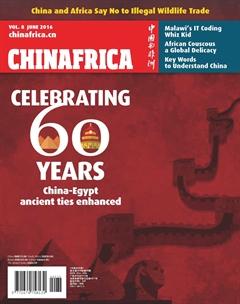Closer Through Culture
With China and Egypt holding the 2016 China-Egypt Cultural Year to mark the 60th anniversary of their diplomatic relations, Hussein Ibrahim, Counselor and Director of Egyptian Cultural and Educational Relations Office in China, speaks to ChinAfrica reporter Xia Yuanyuan about the initiative and its impact on bilateral relations.
ChinAfrica: How did the 2016 China-egypt Culture Year come about?
Hussein Ibrahim: The initiative can be traced back to Egyptian President Abdel Fattah al-Sisis visit to China in December 2014. Chinas Minister of Culture Luo Shugang paid a visit to Egypt in August last year and put the project on the agenda.
As ancient civilizations, China and Egypt have long and glorious cultures, and both have made great achievements in modern arts and culture. Holding the culture year will boost the friendship between [our] two countries. It is a means to intensify the already strong cultural ties.
We are holding cultural events in both countries throughout this year. Over 100 cultural events will be held, with China alone holding more than 60 [in the areas of] music, folk dance, cinema, literature, food, seminars and exhibitions. We are especially focusing on art exchange activities.
What role does cultural exchange play in Chinaegypt diplomatic relations?
Since the establishment of their diplomatic relations, China and Egypt have signed tens of cultural agreements to enable fruitful cultural exchanges. I believe cultural exchanges will enhance our two peoples mutual understanding and improve our two countries cooperation in the Belt and Road Initiative. The culture year is an important effort the two countries presidents agreed on to lift the bilateral relationship to a comprehensive strategic partnership.
The Chinese can gain a better understanding of Egyptian culture and traditional customs through the art performances. We have also invited some outstanding[Chinese] ensembles to Egypt so that our people can know [more] about Chinese culture. I am sure the Chinese performances will receive a warm welcome in Egypt.
We have also proposed some academic exchanges. The president of Benha University [in northeast Egypt] attended an academic forum in Xian [in northwest China] to promote academic exchanges between Chinese universities and Benha University. As far as I know, Benha University already has some agreements on student exchange programs, which will surely help enhance the relationship between our two countries in the future.
How popular is Chinese culture in egypt?
Very popular. There are several culture exchange centers in Cairo and the number of Egyptian students who travel to China for their studies is increasing. I believe they will contribute to promoting culture exchanges between our two countries.
How does egypt balance tourism development with heritage protection? Can it learn anything from China and vice versa?
Heritage-based tourism has become one of the largest and fastest-growing sectors of the Egyptian tourism industry but now the development may cause negative environmental and socio-cultural impacts. It may represent a threat in terms of potential degradation of heritage[sites], which can dispossess communities of their cultural integrity and resources as well as the benefits of tourism. So we have put forward some measures to resolve this problem:
Communication: Increasing public awareness, involvement and support for heritage sites through communication.
Conservation: Ensuring conservation of heritage properties.
Capacity-building: Promoting development and implementation of capacity-building measures.
Communities: Strengthening community involvement.
We hope that we can gain some precious experience from China on this.

